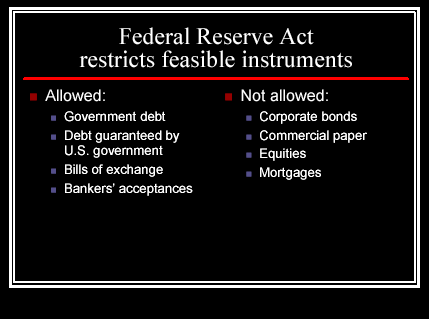Is Nouriel Roubini correct?
http://www.rgemonitor.com/blog/roubini/232729
The whole essay is worth reading but here are the major arguments.
http://www.rgemonitor.com/blog/roubini/232729
The whole essay is worth reading but here are the major arguments.
While aggressive monetary policy easing will not prevent a hard landing as it did not prevent one in 2001 the length and depth of an economic downturn is affected by monetary policy. And it is both the duty and responsibility of central banks to reduce partly avoidable severe economic downturn that lead to massive losses of jobs, welfare and incomes. The job of a central bank is not to bail out the financial system and/or investors but that of bailing out the real economy. Having millions of workers lose their jobs only to teach a lesson to reckless investors and lenders on Wall Street and the City does not make sense.
At this point the financial losses from the reckless credit bubble of the last few years are mostly unavoidable and will not be avoided by easier monetary policy. . . . And the broader financial losses that will be close to 1,000 billion dollars once you add sub-prime, near prime, prime, auto loans, credit cards, student loans, commercial real estate, leveraged loans and lending to the distressed parts of the corporate sector will be massive regardless of what the Fed does. And once the unavoidable hard landing becomes clear to market participants the current delusional hope of the stock market investors that the Fed can prevent such hard landing will fizzle out and stock price will sharply fall as well. . . . So to those who are worried about moral hazard: dont worry as reckless lenders, borrowers and investors will be severely punished as they are already.
a US hard landing followed by a global slowdown will seriously reduce those inflationary force and would like in 2001-2003 rather induce serious deflationary risks. Inflationary pressures may be elevated now but they will fizzle away in short order once the US hard landing is in full swing. Thus, the central banks current concerns with a rise in inflation are misplaced as a US recession will lead to global disinflation (and concerns about deflation as in 2002-2003). There are at least four reasons why these global inflationary forces will abate once this US hard landing occurs:
a) a fall in US aggregate demand relative to supply;
b) a slack in labor market conditions and slowdown in wage growth as the unemployment rates sharply increases;
c) a fall in global aggregate demand as the glut of output from overinvestment in China and some other emerging market economie will face a fall in global demand as the world re-couples with the US hard landing;
d) a sharp fall in oil, energy, food and other commodities prices as a global slowdown emerges.
We are thus set for the repeat of the 2000-2003 cycle when the Fed and other central banks underestimated the downside risks to growth and overestimated the upward risks to inflation and ended up having to aggressively cut rates to deal with the fall in economic activity and the deflation risks that such a US and global recession triggered.
a) a fall in US aggregate demand relative to supply;
b) a slack in labor market conditions and slowdown in wage growth as the unemployment rates sharply increases;
c) a fall in global aggregate demand as the glut of output from overinvestment in China and some other emerging market economie will face a fall in global demand as the world re-couples with the US hard landing;
d) a sharp fall in oil, energy, food and other commodities prices as a global slowdown emerges.
We are thus set for the repeat of the 2000-2003 cycle when the Fed and other central banks underestimated the downside risks to growth and overestimated the upward risks to inflation and ended up having to aggressively cut rates to deal with the fall in economic activity and the deflation risks that such a US and global recession triggered.

Comment